A day and a half after his arrest, a portrait is starting to emerge of Faisal Shahzad, the Pakistani-born American citizen who was pulled off a flight to Dubai at JFK Airport Monday night and arrested in connection with Saturday’s attempted Times Square bombing.
That portrait, compiled based on accounts in several news outlets, is notable for the way in which Shahzad — like so many of the young men behind Islamic terror attacks on the U.S. and Europe — seems to have been simultaneously alien from, and embedded within, western culture. Born in Pakistan’s remote and tribal Northwest Frontier Province, Shahzad, 30, grew up in a country that banned alcohol and taught Islam in school, and he maintained close ties to family members in the region. But he also went jogging in his suburban Connecticut neighborhood, and perused used car websites to find the Nissan Pathfinder that he’s charged with using in the bomb plot. And he seems to have gone over the edge not long after participating in that archetypal American ritual of recent years — defaulting on his mortgage.
Again like many Islamic terrorists, Shahzad does not appear to have come from poverty. His father was an air vice marshal in the Pakistani Air Force, who now lives in a suburb of Peshawar in the Northwest Frontier Province, a cousin told CNN. Shahzad’s brother lives in Canada, CNN reported.
Shahzad first moved to the U.S. in January 1999, aged 19, after he received an F-1 student visa, the Wall Street Journal reports. Previously, he had attended a Karachi-based program with the now-defunct Southeastern University, which was in Washington D.C. Shahzad seems to have briefly enrolled at the American campus after his arrival in the U.S., but transferred in 2000 to the University of Bridgeport in Connecticut, the state where he appears to have continued to live until this week. That same year, he received a computer science and engineering degree from the university.
Over the next few years, Shahzad appears to have followed the pattern of the classic immigrant striver, working while putting himself though business school. In 2001, he worked at cosmetics giant Elizabeth Arden, as a temporary clerk in the accounting department, the New York Times reports. In 2002, the company applied for an H1-B visa for skilled workers for Shahzad, allowing him to the stay in the country for several more years.
In 2004, near the height of the housing boom, Shahzad bought a newly-built house in Shelton, Conn., for $273,000. He put down 20 percent and got an 80 percent mortgage from Chase Home Finance, funding the purchase through the sale of a condo he owned in nearby Norwalk. A broker who showed him the home has said that Shahzad was vocal in his criticism of President Bush, who had authorized the invasion of Iraq the previous year.
In 2005 — while still employed in Elizabeth Arden’s accounting department, it appears — Shahzad received an M.B.A. from Bridgeport — though he seems to have made little impression, positive or negative, on his professors.
Still, Shahzad looks to have been laying down increasingly firm roots in the U.S during this time. At some point during the previous few years, he had married a Colorado-born graduate of UC Boulder, Huma Mian, and in 2005, she petitioned the immigration agency to make her husband a permanent U.S. resident. The next year, Shahzad, armed with his M.B.A., left Elizabeth Arden and took a job as a junior financial analyst at Affinion Group in Norwalk, a financial marketing services company owned by the private investment firm Apollo Management.
But at some point in the following years, things seem to have gone downhill for Shahzad. In 2006, he put his home up for sale, but found no buyers, even as the price was gradually marked down. In the spring of 2009 — around the time he at last became a naturalized American citizen — Shahzad emailed the broker he was working with to say he had decided to “let the house go to the bank,” and planned to return to Pakistan to take care of his sick father. “He was very disappointed that he wasn’t getting his house sold,” the broker told the Journal. That summer, Shahzad quit his job with Affinion, and he and his wife held several tag sales in their neighborhood. In June he flew to Pakistan, via Dubai. (He flew on Emirates Airlines — the same airline on which he tried to make his getaway Monday night.) In September, Chase filed a foreclosure action against Shahzad and his wife, but neither showed up to defend themselves. By the time of his arrest this week, one government official told the Journal, Shahzad was “financially bankrupt.”
There is little evidence that Shahzad had strong Islamist leanings — or even that he was particularly religious — for most of his life. Nonetheless, this February he returned from Pakistan, where, according to his confession as described by law enforcement, he received bomb-making training in the Waziristan region. He told immigration officials that he planned to stay in a motel while looking for a job, and that his wife had stayed behind in Pakistan.
Just over two months later, prosecutors say, Shahzad would respond to an online ad placed by a woman selling a Nissan Pathfinder, and begin to put his violent plan into action.









